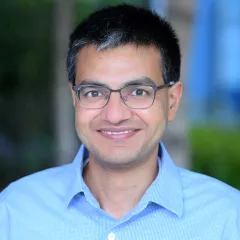
Chintan Parekh, MD
My research focuses on T-cell leukemia, which is a type of blood cancer that affects children and adults. Twenty percent of children and 50% of adults afflicted by T-cell leukemia do not survive, and new treatments are urgently needed for these patients. Leukemias arise due to errors during normal blood cell development. Our goal is to identify these errors that lead to the development of T-cell leukemia. The ultimate goal is to identify errors in leukemic cells that can be targeted for the development of new anti-leukemic treatments.
Leukemia
Education
Seth G.S. Medical College, Mumbai, India, M.B.B.S.
King Edward Memorial Hospital, Mumbai, India
Senior House Officer, Pediatrics, Swansea NHS Trust, Swansea, United Kingdom
Department of Pediatrics, Women and Children's Hospital of Buffalo, Buffalo, New York
Pediatric Hematology-Oncology, Children’s Hospital Los Angeles, University of Southern California, Los Angeles, CA
Accomplishments
ECFMG, 2004
American Board of Pediatrics, 2007
American Board of Pediatric Hematology Oncology, 2011
American Society of Hematology
The Society for Hematology and Stem Cells Travel Grant, 2010.
Winner of the 13th Indian Academy of Pediatrics Quiz (national level), The Indian Academy of Pediatrics National Conference, Patna, India, February 10, 2001.
Second Position at the student workshop on human genetics, The Indian Council of Medical Research, July 23 2002.
Dr. Moolgavkar Gold Medal for standing first in Surgery at the Final M.B.B.S university exams, October 2001.
Dr. Shirwalkar General Proficiency scholarship for standing first in anatomy, physiology and biochemistry, Dr. Shirwalkar competitive exam, 1998.
Winner of the Dr. Paranjpe Memorial Intercollegiate Pharmacology Quiz, G.S. Medical College, October 1999.
Honors in the M.B.B.S exams (Mumbai University, India) in Surgery, Preventive Medicine, Pharmacology, Pathology, Microbiology, Anatomy, Physiology and Biochemistry
Publications
Parekh C, Gaynon PS, Abdel-Azim H. End of induction minimal residual disease alone is not a useful determinant for risk stratified therapy in pediatric T-cell acute lymphoblastic leukemia. Pediatric Blood and Cancer, 2015 May 14. doi: 10.1002/pbc.25582. [Epub ahead of print] PMID: 25976383
Chung B, Montel-Hagen A, Ge S, Blumberg G, Kim K, Klein S, Zhu Y, Parekh C, Balamurugan A, Yang OO, Crooks GM. Engineering the human thymic microenvironment to support thymopoiesis in vivo. Stem Cells, May 2014. PMID: 24801626
Kim WS, Zhu Y, Deng Q, Chin CJ, He CB, Grieco AJ, Dravid GG, Parekh C, Hollis RP, Lane TF, Bouhassira EE, Kohn DB, Crooks GM. Erythropoiesis from human embryonic stem cells through erythropoietin-independent AKT signaling. Stem Cells, Feb 2014. PMID: 246776521.
Corselli M, Chin CJ, Parekh C, Sahaghian A, Wang W, Ge S, Evseenko D, Wang X, Montelatici E, Lazzari L, Crooks GM, Péault B. Perivascular support of human hematopoietic stem/ progenitor cells. Blood 11;121(15):2891-901, April 2013. PMID: 234120951.
Parekh C, Crooks GM. Critical Differences in Hematopoiesis and Lymphoid Development between Humans and Mice. J Clin Immunol, 33(4):711-5, May 2013. PMID: 23274800
Research
Our research focuses on T-cell leukemia, which is a type of blood cancer that affects children and adults. Twenty percent of children and 50% of adults afflicted by T-cell leukemia do not survive, and new treatments are urgently needed for these patients. Leukemias arise due to errors during normal blood cell development. Our goal is to identify these errors that lead to the development of T-cell leukemia. The ultimate goal is to identify errors in leukemic cells that can be targeted for the development of new anti-leukemic treatments.
Visit the Parekh Laboratory.